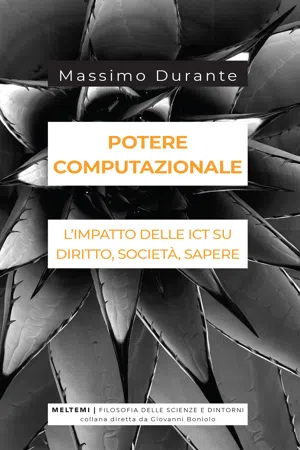
- English
- ePUB (mobile friendly)
- Available on iOS & Android
About this book
Deleghiamo decisioni e compiti ad agenti artificiali, meccanismi d'apprendimento automatico, procedure algoritmiche, in breve, a sistemi computazionali. Tutto ciò non vuole portarci sulla Luna, rimpiazzare gli esseri umani con legioni di androidi, creare scenari fantascientifici à la Matrix o programmare la Macchina di Person of Interest. Si tratta di una rivoluzione del quotidiano: tanto più profonda, inosservata e diffusa quanto più investe la trama delle nostre abitudini e forme di vita. Come tutte le grandi rivoluzioni si radica nelle pratiche correnti. È a tale livello che i suoi effetti devono essere studiati e valutati secondo una precisa linea d'indagine: il potere computazionale, che l'alimenta, si esercita adattando il mondo e la sua rappresentazione al modo di funzionamento delle tecnologie digitali dell'informazione e della comunicazione. Così facendo, aspira a governare la società con la produzione di specifiche e nuove forme del sapere.
Frequently asked questions
- Essential is ideal for learners and professionals who enjoy exploring a wide range of subjects. Access the Essential Library with 800,000+ trusted titles and best-sellers across business, personal growth, and the humanities. Includes unlimited reading time and Standard Read Aloud voice.
- Complete: Perfect for advanced learners and researchers needing full, unrestricted access. Unlock 1.4M+ books across hundreds of subjects, including academic and specialized titles. The Complete Plan also includes advanced features like Premium Read Aloud and Research Assistant.
Please note we cannot support devices running on iOS 13 and Android 7 or earlier. Learn more about using the app.
Information
Table of contents
- Introduzione. Il potere computazionale
- Capitolo primo La rivoluzione dell’informazione
- Capitolo secondo Tecnologia: da strumento ad ambiente
- Capitolo terzo Intelligenza artificiale e umana
- Capitolo quarto Memoria e oblio
- Capitolo quinto Dato, informazione e conoscenza
- Capitolo sesto Verità e fake news
- Capitolo settimo Il governo degli algoritmi
- Capitolo ottavo L’asimmetrica distribuzione di dati e diritti
- Capitolo nono Lealtà, defezione e protesta
- Conclusione. Lo scaffale del mondo
- Bibliografia
- Ringraziamenti